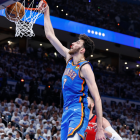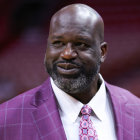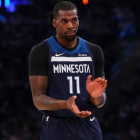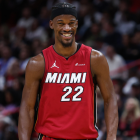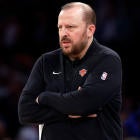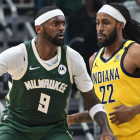There's this phrase NBA players often use in the wake of winning their first championship. We've heard it from role players, bench scrubs, superstars and glue guys.
"They can't ever take this away from me."
Perhaps it says something about athletes that they feel the world is always trying to take away their accomplishments, but nonetheless, that's the thing the first championship means. They will not finish playing with the regret of not winning it all that hangs over so many great players.
Going from one title to two, however, puts a player into a place in history. After the Golden State Warriors secured their second NBA championship in three seasons with this core by going 16-1 in the playoffs Monday with a 129-120 win over the Cleveland Cavaliers in Game 5, Stephen Curry is in that category.
The resume
Having done this in only eight seasons, it makes Curry an all-time great. Even if Curry were to fall from grace next season, which seems unlikely with this well-positioned title juggernaut, that place is already secure. He's the best shooter ever and already a Hall of Famer.
Consider his past three seasons -- 207 regular-season wins -- including the NBA record 73 last in 2015-16 -- against 39 losses. Two championships. Two MVPs, one unanimous. A scoring title. Going 16-1 in the playoffs, beating LeBron James twice. Curry and the Warriors not only have have redefined the way basketball is played, but also the way it's watched.
Then there's what Curry did this season. Curry hasn't dominated in the same way, and his mistakes have been magnified. You're free to point out it's because of Kevin Durant, but that doesn't change what Curry's done. He's more in control of the game than ever. His defense has been lights out and he's contributing as a rebounder. For the playoffs, he averaged 28.1 points, 6.2 rebounds, 6.7 assists, and shot 48 percent overall, 42 percent from deep.
In the Finals, Curry averaged 28.6 points (with 44-39-90 shooting splits), 8.8 rebounds, 9.4 assists and 2.2 steals. The numbers do him justice, but not enough. Durant has been the best player for the Warriors, this season and in these Finals. But Curry has been the most important player, and the one who decided the most of the Finals. He is the one Cleveland's defense consistently focused on. He opened up everything and passed every test.

Curry's legacy
When an all-time player gets that first title, he punctuates his career in a way guys like Charles Barkley and Karl Malone never could, and that is a monumental leap. And No. 2 changes your legacy even more than the first.
Consider the guys never won a second. Kevin Garnett -- a phenom from age 16, an MVP, a surefire Hall of Famer: one title. Dirk Nowitzki, the greatest European-born player in NBA history and one of the five best power forwards in league history: one title. Jason Kidd, who also made his mark at point guard: one title, and he wasn't the best player on his team when he did. Same for Gary Payton, Oscar Robertson, Clyde Drexler, and even the logo, Jerry West.
Championships are team accomplishments, often subject to fate and matchups. But the Warriors have thrive despite last year's monumental collapse in the Finals. While they added Durant, they also responded with a focus on trying to improve every game.
Winning two titles is a dream for most superstars; Curry has seemingly breezed his way through it. When criticized for poor play, he delivered late in the series vs. Oklahoma City last year. When he was called to task for last year's failures, he deferred to Durant to get him involved, then learned to thrive next to him. They call Curry the Golden Boy and that moniker fits.
There will be comparisons to LeBron James. The player who has held the league in the palm of his hand the past 10 years has three titles; Curry has been at the summit for three years with two rings. Whether that's fair doesn't matter. Championships are how history judges players. You can be great without a ring and revered with just one. Two championships makes a star an all-time great.
There's little reason to think Curry's done. He just turned 29. His prime likely lasts the next four to five years, considering how little he relies upon athleticism with a skill-based game. Bad luck or injury could rob him of a year or two but A) the Warriors' roster allows him to rest and the ability to win in his absence, and B) even if that happens, he'll still have four to five prime seasons to add to his total. The Warriors' core is young and versatile and their front office and coaching infrastructure are, by their own assessment, "light years ahead" of everyone else.
Three or more titles would put Curry on the oft-discussed Mount Rushmore of the NBA. Curry's 2016 season will likely go down as the greatest individual regular season in NBA history, and this three-year stretch compares with any three-season run in history. Jordan. Magic. Bird. LeBron. Duncan. Wilt. Curry stacks up among those greats. That's only made possible by this second championship, though.
This second title ends talk of him or his team being a flash in the pan, silences the idea of a point guard (even a score-first one) being incapable of being (arguably) the best player on a title team, ruins the "jump-shooting teams can't win championships," and cements Curry on a level that the Big Ticket, the Logo, the Glove, and many other incredible players never reached. Curry has elevated himself to a new level of greatness, with no end in sight.
One title proved that Curry was one of the game's greats.
His second has proven him a legend.















